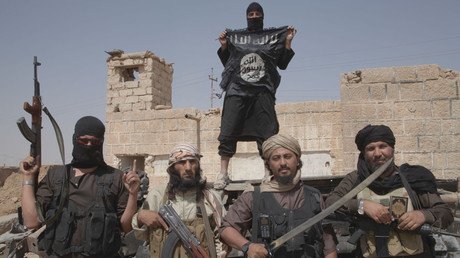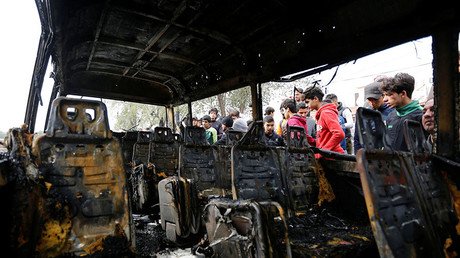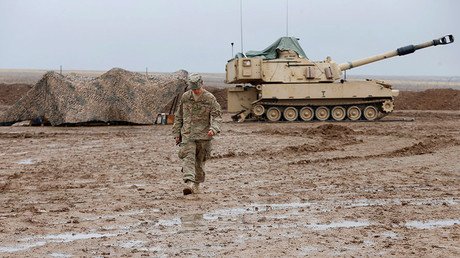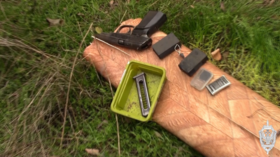Iraqi forces’ actions in Mosul ‘may amount to war crimes,’ Human Rights Watch tells RT
A new Human Rights Watch report on the liberation of Mosul alleges disturbing conduct by Iraqi state-sponsored militias, including looting and outright destruction of villages with explosives and heavy machinery.
“Our research demonstrates that Iraqi armed forces that are fighting ISIS [Islamic State, formerly ISIS/ISIL] to retake a couple of villages and a small town near Mosul – they looted, damaged and destroyed homes. And that was apparently with no military necessity for those demolitions,” Ahmed Benchemsi, HRW communications and advocacy director for Middle East & North Africa, told RT.
“[That] means that these acts amount to war crimes,” he added, explaining that the story offered up by the Iraqi Popular Mobilization Forces (PMF) leaves much to be desired, is inconsistent and does not make sense considering what the PMF said it was trying to achieve.
“The laws of war prohibit attacks on civilian property except when an enemy is using it for military purposes. They also prohibit indiscriminate attacks, including attacks that treat an entire area, such as a village, as a military objective,” HRW writes in its report.
The damning report alleges that the PMF has been documented carrying out unnecessary demolitions of buildings, including destroying homes and looting them. The organization used satellite images to show the scale of the alleged destruction. They appear to corroborate witness statements – including those by local military commanders.
A total of 350 buildings were documented as destroyed in the village of Ashwa, outside Mosul. HRW asked the PMF for an explanation of its conduct in the village, as well as the villages of Khoytlah and Mashirafat al-Jisr in December 2016. It received a written response that suggested that Islamic State booby-trapped buildings, roads and private housing to blow them up later when the liberating forces arrived.
“The liberation process was held up for nearly two days in order to avoid destroying infrastructure and private property that were used by the group as headquarters and military barracks and to compel liberating troops to use excessive force. These forces succeeded in avoiding that option by calmly seizing land and pushing the terrorists out of the villages,” the statement added.
HRW isn’t convinced, however. Commenting on the satellite images that show roofs completely blown off, the report says the signs point to heavy explosive charges, as well as fire and bulldozers – not booby-trapping.
“Burning, demolishing, or bulldozing homes is a wholly inappropriate mechanism for mine clearance, and would likely detonate any improvised explosive devices (IEDs). In addition, almost all of the burnt buildings still have their load-bearing exterior and interior walls intact, with only the roof missing, which is inconsistent with IED blasts,” HRW writes.
The PMF statements “did not acknowledge that the PMF conducted extensive property demolitions after retaking the areas, let alone provide an explanation for the destruction.”
HRW also shows how the villages retaken from IS were incorporated into a secure zone controlled by the PMF. So with IS completely expelled, “the whole area inside was well enough protected that there would have been no military need for PMF forces to demolish the homes...”
Moreover, there is no satellite proof of demolitions in nearby villages, HRW says, which further contradicts the logic of the PMF’s supposed tactics.
Further to this, two Muslim-Christian mixed locations south of Mosul saw instances of looting and destruction once retaken from IS – the Christian town of Bakhdida and the mixed Sunni/Christian village of al-Khidar.
Civilians reported escaping the area a week before IS was driven out, returning to find their homes looted three weeks later.
HRW has been unable to identify the forces behind the unlawful tactics, but has called on the Iraqi government to carry out an investigation into the PMF’s possible “war crimes and hold those responsible to account.”
In the meantime, there are mounting fears that the complete liberation of Mosul from IS forces will result in its total destruction. The US, which has been providing ground support to Iraqi forces, has already admitted that west Mosul will be a difficult fight, while the eastern part is already reported to be in an uninhabitable state, with 144,500 people displaced according to the latest data from the International Organization for Migration.
Some 750,000 people still remain in western Mosul, according to a UN count. Electrical, food and water shortages are slowly driving the population to the brink of destitution.
“The trends that we’re seeing are deeply disturbing. Already there are many families that are in trouble, and the fighting hasn’t even started,” Lise Grande with the UN mission in Iraq told RT. “Four-hundred thousand civilians are estimated to be in the Old City on the western side of the river, where fighting is about to start. We’re very concerned about the civilians there… it’s highly populated and densely packed,” she warned, adding that the fight to retake it could take weeks, even months.














